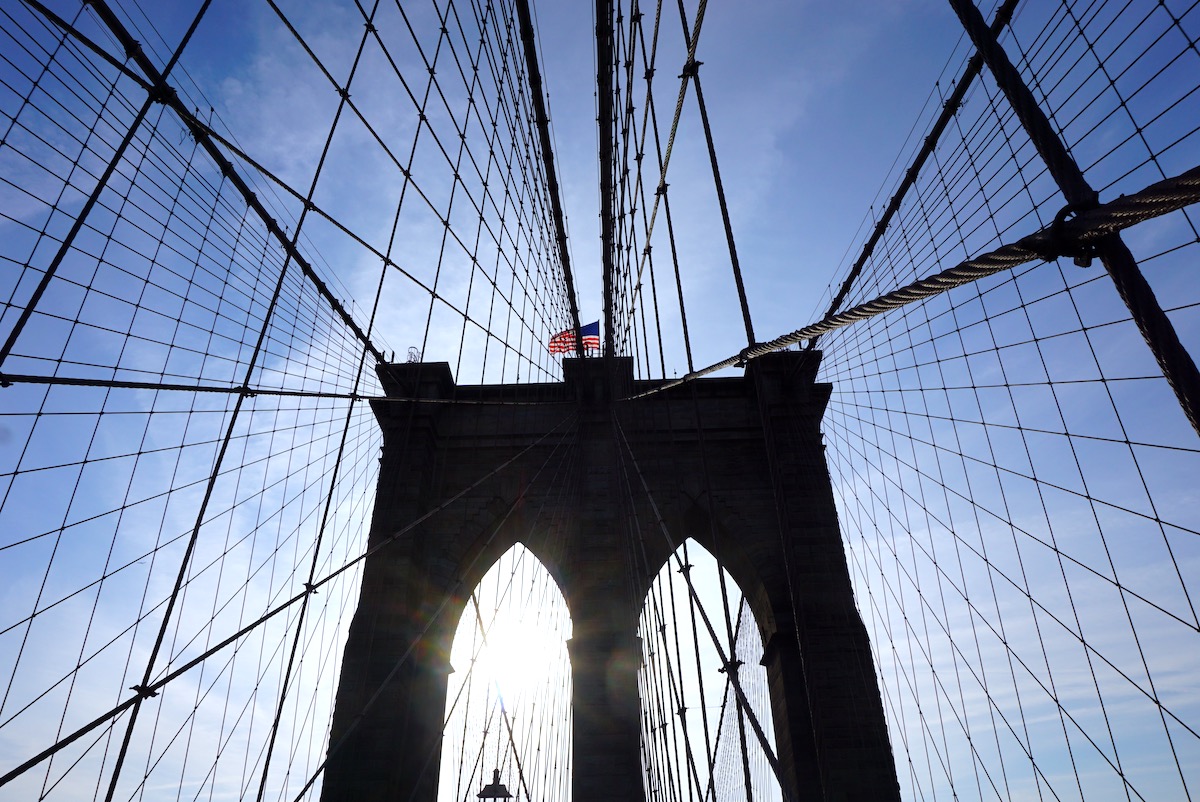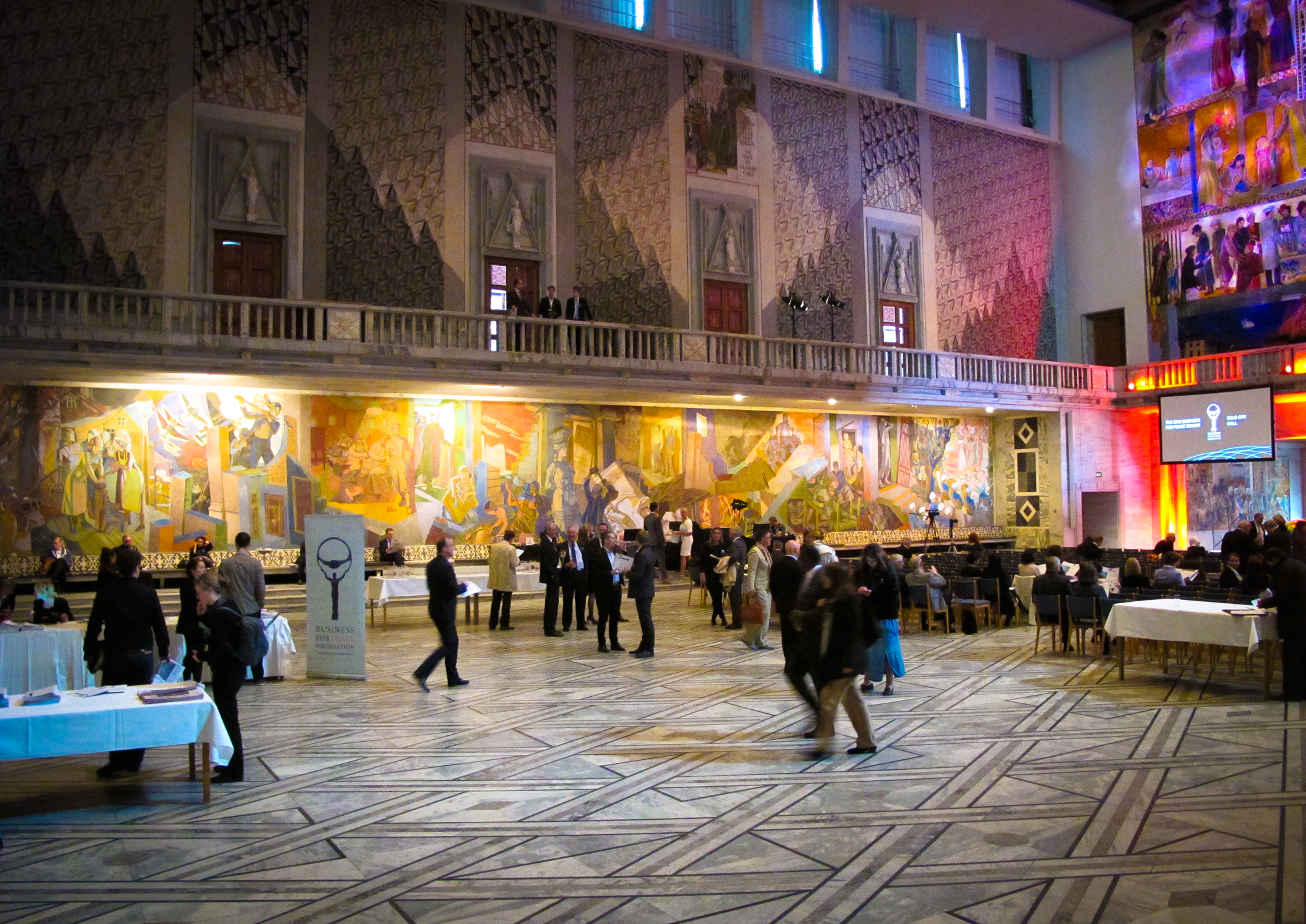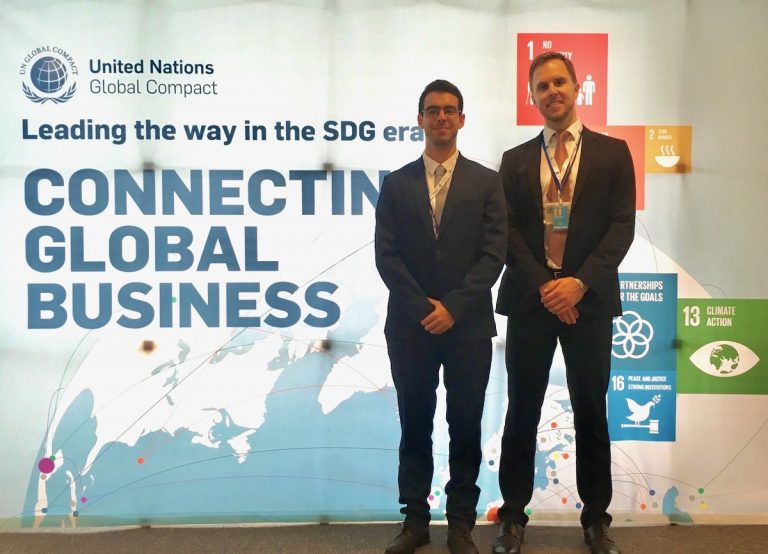It was raining on the first day of the UN General Assembly week in New York. First Avenue had been closed to traffic and the main pedestrian crossing had been painted with a bright LGBT rainbow. Wailing sirens filled the air as motorcades of black SUVs roared passed. I’d been in New York for only a week and there I was, standing huddled under an umbrella with a swathe of UN global compact lanyards hanging around my neck, watching dignitaries from all over the world mingle and saunter into the UN Secretariat building.
Human rights and business
Most people understand the UN’s role as being a meeting place for the world’s leaders, as well as being a peace keeping force in case these diplomatic efforts fail. But far fewer people are aware of the smaller niche departments inside the UN, like the Global Compact (UNGC).
The UNGC is ‘the world’s largest corporate sustainability initiative’. Established by then Secretary General Kofi Annan in 2000, it is a voluntary program with a list of some 9,000 participant companies. All have promised to adhere to the UNGC’s ten principles (encompassing human rights, the environment, labour issues and anti-corruption).
It’s all about helping companies to incorporate the principles into their everyday operations, and to understand their responsibilities as good corporate citizens. All in a bid to boost long-term business success.
Working as an intern at the UNGC was a great fit for my own background. I’d studied undergrad economics a decade ago, and I was at the tail-end of a Masters of international relations and international law.
My international law focus led me to a placement with the human rights and social sustainability team. At the UNGC this meant helping participating companies to understand the impacts of their operations, and how they can align their strategies with the organisation’s ten principles.
A Human Rights explainer…
For many, particularly us in the west, human rights is an abstract concept. If you haven’t had to fight for your basic human rights it is understandable that you might take them for granted. We may often think of governments (good and bad) as the principle actors in expanding (or threatening) human rights, but in a rapidly globalizing world it’s becoming increasingly apparent that corporations have a role to play in protecting people’s human rights.
When the United Nations was formed in 1945, and when the Universal Declaration of Human Rights (UDHR) was adopted a few years later in 1948, it ushered in a new era of respect for international law.
Amid the ruins of World War 2, it brought the concept of human rights into the mainstream.
Since then almost every country in the world has signed-on to the Charter of the United Nations, giving broad coverage to the moral and legal foundations of the UN. The UDHR remains today as one of the most important international treaties.
But the key point for this discussion is that these treaties, agreements and organisations were all designed to address states, not corporations.
Corporations bigger than countries
Micheal Posner (Professor of Business and Society at NYU’s Stern School) gave a talk at UNSW early last year, and one stat really stuck out:
“Out of the world’s 100 largest economies, more than half are not countries, in fact around half of the world’s largest economic powers are companies.”
Now, comparing companies (revenue) and countries (GDP) is not an exact science. But it does highlight the massive economic power that is wielded by corporations, power that is under far less scrutiny than that of states. (By this measure Walmart is the 30th largest economy, almost the same size as Norway).
In this globalized world, should companies be held to account for their human rights performance the same way governments are?
It’s a lofty question, and it’s complicated by the fractured structure of these corporations. For many businesses, globalisation has spread their production processes across the globe through multiple government jurisdictions, and with such complexity that companies can lose sight of the breadth of their supply-chains.
Which leads to more questions: what standards should companies adhere to? Should they impose consistent benchmarks across their global operations, or adopt those of the region in which they operate? Should there be enforcement mechanisms? Can we depend on the market for regulation, or should there be intervention to make sure they’re doing the right thing?
It’s here we have the intersection of business and human rights.
In a simplified context you can think of human rights in terms of labour and supply-chain issues. Only last year we saw examples of labour rights violations in the Australian seasonal farm-hand industry as well as systemic breaches by 7-Eleven. (Notably uncovered by the ABC’s Four-Corners, showing investigative journalism ain’t dead.)
Similarly Transfield faced persistent allegations of human rights abuses at detention centres on Nauru and Manus Island.
And the accusations against Volkswagen, that they tampered with software systems to dodge emissions standards, shows how much damage can be done to a company when it steps beyond the boundaries of responsible corporate practice.
There is a tension here, and it defines the role of the UNGC.
On the one side there is a company’s social contract to uphold a certain standard of respect for human rights in the communities in which they operate. But of course this then rubs-up against the commercial pressures facing these profit maximizing organisations, where cost reduction and competitive forces are the focus.
This had been the subject of considerable debate at the UN for decades, and it was in 2011 that the UN Guiding Principles on Business and Human Rights were established. These principles were orchestrated by John Ruggie (Professor in Human Rights and International Affairs at the Harvard Kennedy School) and the UN Human Rights Council in 2011 and they define the responsibility that businesses have to “avoid causing or contributing to adverse human rights impacts in their own activities and to seek to prevent or mitigate adverse impacts that are linked to their operations”.
The UNGC recognises the Guiding Principles as a reference point, to help companies ensure they are not complicit in human rights abuses. But in the end, participation in the UNGC is voluntary, it has no enforcement powers, it doesn’t wield a stick and it is not an assessment tool. Instead it offers a carrot to companies.
It offers them tools, research and expertise to help them to, first, understand what their responsibilities are, and second, how they can improve both their operations and the lives of the communities in which they operate.
Recognising climate change as a human rights issue
A key part of the UNGC’s work is to help companies understand and mitigate their climate change impacts, and part of this is helping them recognise climate change as a human rights issue.
This work centres around the concept of climate justice and the painful paradox that those who are most vulnerable to the impacts of climate change (low income communities, developing countries, women, children, the elderly, disabled persons) are those who have contributed least to its cause.
The case for action is clear, businesses have a lot to gain from mitigating the worst climate change impacts. And recognizing climate change as a human rights issue is an important step for a business in the process of understanding its responsibility to respect human rights, and avoid contributing to any adverse welfare outcomes through their operations.
This both focuses climate action on helping the most vulnerable, while also ensuring those actions don’t make life worse for the communities involved.
Whether it be food manufacturers whose crops are in peril, insurers facing massive claims from savage storms, or commercial tour operators seeing islands and reefs disappear; assessing these threats in terms of human rights can help ensure that it is people and their communities who are at the centre of the effort.
Impact investing
In a system where companies are growing bigger than some countries, it is increasingly difficult to manage human rights issues using regulation as a stick. The challenge is large, however, it is in fact the finance industry that is kicking goals in this space with the concept of impact investing hitting the mainstream.
At the UNGC it is the Deputy Director, Gavin Powers, who is leading the way on the finance side of things. Having worked for a fund-manager in Australia I soon got to talking to Powers about everything from activist investors, to ESG standards and the future prospects of social enterprises.
Powers is a fervent supporter of impact investing, a process that seeks to not only earn a positive financial return from an investment, but also a positive social or environmental outcome. Do well and do good, is the motto.
Impact investors will only back business which are doing good for society and/or the environment. And while there are differing opinions about what constitutes a sufficiently “good” enterprise, there is ample proof of the social outcomes of these investments, as well as the financial outcomes, but that’s a story for next time.
Standing in the rain
The UN is a vast and sprawling organization, both in terms of its operations and its influence. While there is important work done day-to-day at departments like the UNGC, headline events like the UN General Assembly Week represent the less tangible political leverage of the organization. This event is unique in bringing together so many world leaders, and the world looks on with very high expectations.
Standing under that umbrella I watched the process unfold. On this day I was working on an event, the UNGC Private Sector Forum, where the Secretary General Ban Ki-moon opened proceedings, Canadian Prime Minister Justin Trudeau gave the keynote speech and actor Ewan McGregor also spoke in his role as UNICEF Ambassador.
In Australia it’s easy to become jaded about our government’s inaction on climate change and questionable treatment of refugees. But in spending time at the UN it was re-energising to see the work of not only the most powerful countries, but also the world’s biggest companies in finding innovative solutions to global challenges.
It was a rare opportunity to observe the functioning and outcomes of these events. To see the way world leaders and diplomats and business leaders interact. Walking through the many halls and the corner alcoves and the cafeterias, there were small huddled groups and tables littered with coffee cups and papers. For a world leader it is not an option to miss this event.
And it’s not only about the individual leaders; it’s also about their entourages of ministers, and aides. Their relationships with their counterparts from other country missions is vital in making these conversations happen. The logistics of the event are staggering, but on another level there is a certain randomness and requisite chaos to the way people move through the hallways and events.
The debate surrounding the relevance of this ageing institution is coming to a head, the concept of global cooperation, that is at the heart of the United Nations, is under attack. Having said that, a big mistake people make is assuming that the UN is not self-aware. The smart and dedicated people at the helm are all too aware of the challenges ahead. The work of the UNGC, in forging linkages with businesses big and small, is just one example of the organisations continuing evolution.





